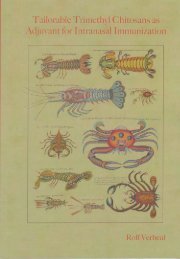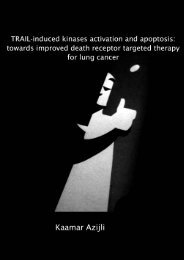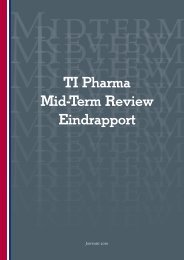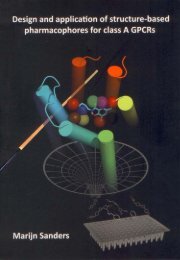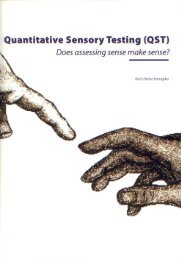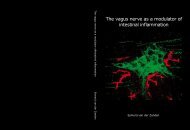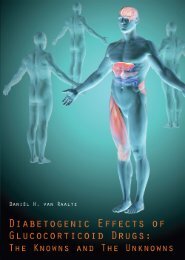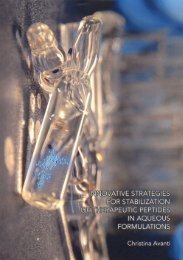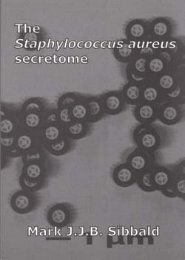Experimental infection and protection against ... - TI Pharma
Experimental infection and protection against ... - TI Pharma
Experimental infection and protection against ... - TI Pharma
Create successful ePaper yourself
Turn your PDF publications into a flip-book with our unique Google optimized e-Paper software.
Safety <strong>and</strong> Immunogenicity of a Recombinant Plasmodium falciparum AMA1<br />
Malaria vaccine Adjuvanted with Alhydrogel TM, Montanide ISA 720 or AS02<br />
Lastly, PfAMA1 has also been evaluated in a multi-antigen malaria vaccine<br />
delivered in an attenuated vaccinia virus. Although weak protective effects were<br />
found, immunogenicity in that trial was poor [9].<br />
After one year follow-up, we found antibody levels still to be significantly higher<br />
than baseline for all groups. This is in sharp contrast to the results of Malkin et<br />
al. [10] who reported detectable antibodies in only 50-90% of volunteers by day<br />
364, even though they had been boosted much later (on Day 180). This suggests<br />
that a more condensed immunisation regime may affect the persistence of<br />
antibodies.<br />
In this trial we have shown that the combination of clinical grade PfAMA1 FVO<br />
[25-545] P. pastoris expressed material with either Montanide or AS02 is<br />
significantly more immunogenic than previous PfAMA1 formulations, being<br />
capable of inducing high levels of antibodies for both dosages in both adjuvant<br />
groups. A positive trend between antigen dose, antibody response <strong>and</strong> in vitro<br />
parasite growth inhibition could be detected, although the effect of antigen<br />
dose on immunogenicity was negligible compared to the effect of varying the<br />
adjuvant. The wide variety of immune responses found in different adjuvant<br />
formulations stresses the importance of adjuvants as a critical component in<br />
malaria vaccine development.<br />
The functionality of vaccine induced antibodies was assessed by growth<br />
inhibition assay. Although this assay has not been validated as a correlate of<br />
<strong>protection</strong>, this trial demonstrates that the st<strong>and</strong>ardised assay is able to<br />
demonstrate recognition of the native protein <strong>and</strong> thus functionality in vitro.<br />
Different adjuvants are known to prompt immune responses towards Th1 or<br />
Th2. It has been previously reported that AS02 induces an immune response<br />
skewed towards Th1 [37], with production of primarily IFNγ. In contrast<br />
Alhydrogel is known to be Th2 inducer [43]. In this study, ratio’s of cytokine<br />
production at day 84 showed relatively more IFNγ over IL-5 production in the<br />
Montanide <strong>and</strong> AS02 groups suggesting a pro-Th1 response, although<br />
statistically non-significant. Interestingly, the additional third immunisation<br />
generally did not lead to a further increase in IFNγ or IL-5 production or in<br />
lymphocyte proliferation. Rather, many volunteers showed a reduction in the<br />
response after the third immunisation. This difference could not be explained by<br />
inter-test variability. It remains to be investigated if it indicates a shift in the<br />
relative balance between immediate effector cells <strong>and</strong> long-lived memory cells.<br />
51



